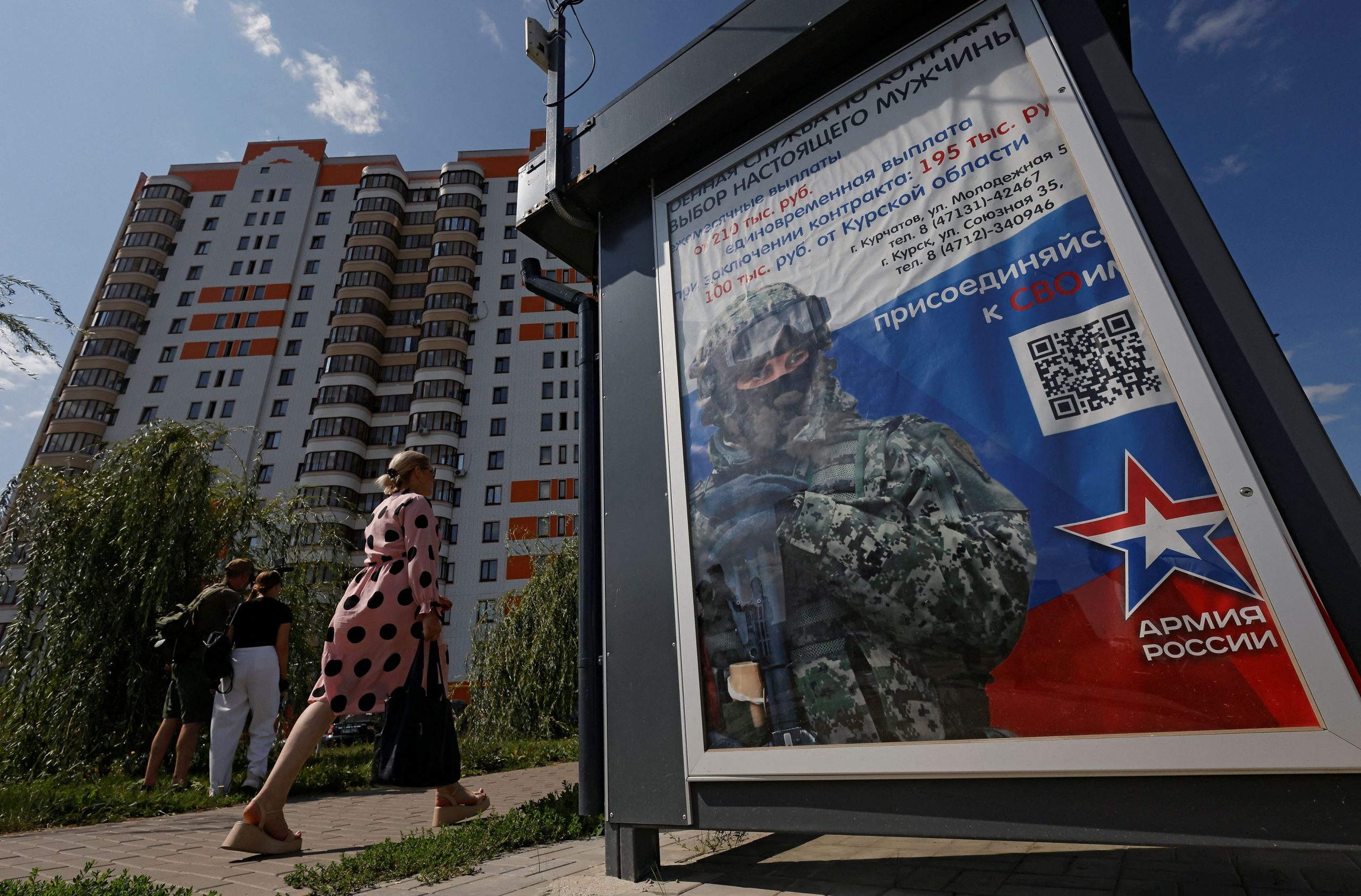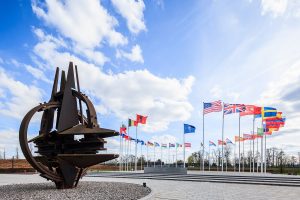The coalescing partnership of autocracies led by China and Russia will impose strategic choices on Western democracies, no matter who wins the U.S. presidential election.
Can the U.S. and its allies deter all these rivals—including Iran and North Korea—at the same time, given the decay in the West’s military-industrial base and the unwillingness of voters to spend dramatically more on defense?
And if not, should, and could, an accommodation be sought with one of the rival great powers? If so, which one—and at what cost?
The current moment is uniquely complicated, with multiple crises around the world increasingly interconnected. Bloody wars in Ukraine and the Middle East are showing no signs of abating, Iran is contemplating a military response against Israel, China is engaging in low-level sea clashes with the Philippines and intimidating Taiwan, and North Korea is ramping up provocations against South Korea.
Retired Army Lt. Gen. Keith Kellogg, who served in senior national-security roles in the Trump White House, compared the state of the world to a game of whack-a-mole—with all the moles now up. “Because the crises erupt at the same time, the capability is not there to handle all simultaneously, and it gets out of control,” he said. “The ability to react is limited. You’re stretched, and you never want to be stretched.”
Though still by far the biggest military power, the U.S. is hard-pressed to deal with the world on fire, especially as China keeps growing its military muscle, some strategists warn. While the U.S. and the European nations have moved to increase military production, including at brand-new ammunition plants, since the Russian invasion of Ukraine in 2022, these steps are nowhere near sufficient for the requirements of modern conflict, they say.
“We are already involved in two wars, and we are struggling right now to keep up providing munitions and equipment to our allies. If we get involved in a global war, we would be significantly challenged to deal with our adversaries and the capabilities that they have,” said retired Gen. Jack Keane, a former vice chief of staff for the Army.
While acknowledging the depletion of stocks, the Pentagon says that the U.S. remains ready for all potential scenarios, including a full-scale war with China that it says it considers neither imminent nor inevitable. “I am fully confident in our force, and you should be, too,” Air Force Gen. CQ Brown, chairman of the Joint Chiefs of Staff, said to applause at the Aspen Security Forum last month.
Still, inside the Republican party, influential voices—including vice-presidential candidate JD Vance—have pointed to America’s inability to produce enough munitions as a reason to abandon Ukraine and commitments to European security. They say the U.S. should pivot to the one area that really matters: East Asia. “The United States is fundamentally limited,” Vance said in a February speech in Germany.
One potential approach mulled within Trump’s orbit would be to attempt the “reverse Kissinger,” a reference to Henry Kissinger ’s deal with Communist China that cemented Beijing’s split from the Soviet Union in the 1970s. The idea this time is to woo President Vladimir Putin toward the U.S., away from his strengthening bond with Chinese leader Xi Jinping —at the expense of Ukraine, and Europe.
“One of the things that America should do, from a purely American strategic perspective, is to figure out a way to have a grand bargain with Russia,” said Sumantra Maitra, director of research at the American Ideas Institute, a conservative think tank. “Whether that is doable or not is a difficult question, depending on where Russian red lines lie. But fundamentally it would mean a new security architecture in Europe.”
Many Republicans, as well as Biden-Harris administration officials, describe such ideas as a delusional folly. After hundreds of thousands of Russian soldiers were killed or maimed with the help of American weapons in Ukraine, and after the U.S. and allies spent hundreds of billions of dollars on the war there, there can be no accommodation with Putin or going back to the status quo ante, they say.
“These four dictators—Putin, Xi, the Iranian ayatollahs and Kim Jong Un —are all in this together, in an unholy alliance, which reminds me of my father’s war, World War II,” said Rep. Michael McCaul (R., Texas), chair of the House Committee on Foreign Affairs.
Some senior Republicans who would likely have top positions in a second Trump administration, such as former Secretary of State Mike Pompeo , have called for further tightening sanctions on Russia and dramatically increasing military support for Ukraine, while also maintaining strong pressure on China, North Korea and Iran. It isn’t clear what path Trump, if elected, would adopt. The former president has repeatedly promised to strike a peace deal for Ukraine in 24 hours , without explaining how.
Trump’s rival in the U.S. presidential race, Vice President Kamala Harris , has indicated she will, by and large, seek continuity with the approach of President Biden , who returned U.S. forces to Europe’s eastern flank, welcomed Sweden and Finland into the North Atlantic Treaty Organization, provided Ukraine with weapons, and strengthened a network of alliances and partnerships in Asia.
In Thursday’s acceptance speech at the Democratic National Convention, Harris spoke of an “enduring struggle between democracy and tyranny” and said she would make sure “America—not China—wins the competition for the 21st century, and that we strengthen, not abdicate, our global leadership.”
That is a sentiment many Republicans share. If the U.S. wants to maintain its privileged position, it has no choice but to continue its engagement in all major theaters around the world, said Sen. John Cornyn (R., Texas). “Nothing happens without American leadership,” he said. “Like it or not, but this is part of the price we pay for being the pre-eminent economy and superpower in the world.”
European and, to an extent, Asian allies have been comforted by the rhetoric of the Biden-Harris administration. But Trump’s unpredictability and threats while in office also forced European nations to make painful choices, such as increasing investment in defense, that proved to be indispensable once Russia invaded Ukraine.
“The really interesting question for 2025 is which leader will be more capable of rounding up the strongest posse that actually deters our adversaries,” said Brian Katulis, a senior fellow at the Middle East Institute.
The gravest risk of any attempt to drive a wedge between Russia and China by sacrificing Ukraine and Europe’s security is that such a shift could backfire by destroying America’s most valuable foreign-policy asset—its own network of alliances, some Biden administration officials and Democratic leaders warn.
“It would accelerate hedging by our partners in the Indo-Pacific and aggression by China. It would make every ally and partner we have, globally, question whether they can count on us,” Sen. Chris Coons (D., Del.) said.
While China, Russia, Iran and North Korea are all increasingly cooperating in diplomatic, intelligence and military affairs, they still harbor mutual suspicions. And though they agree on the need to remove the U.S. as the pre-eminent world power, their priorities in their own regions don’t always overlap. China so far has declined to provide direct military help to Russia, and the partnership between these autocracies is nowhere near the interoperability and mutual defense commitment of a true alliance like NATO.
“Yes, there are thickening connections between some of these states, but there’s nothing like the ballast, the history, the shared values that still exist within the U.S. alliance system,” said Michael Fullilove , executive director of the Lowy Institute, an Australian think tank. “The West still retains enormous strengths that we should not undervalue.”
China’s two strategic goals—splitting the U.S. from Europe while propping up Russia—remain mutually exclusive as long as America’s commitment to Europe remains solid, Western officials say.
Many European governments, however, are ready to toe America’s line on China only as long as they think they can count on Washington’s protection from Putin. “If the U.S. appeases Russia to focus on China, Europe will have to deal more with China to focus on Russia,” said Anton Hofreiter, chair of the European affairs committee in the German parliament. “If the U.S. decides to leave Europe alone, the voices of appeasement in Europe would be much stronger, saying that we are not strong enough to confront both China and Russia without the Americans.”
China is certainly eager to woo European governments, a task that has become much more difficult because of Beijing’s support for Putin.
“Europe needs to do some strategic independence,” said Wang Huiyao , president of the Center for China and Globalization, a think tank in Beijing. “China can help the EU solve the Russian problem, and the EU can help China solve the U.S. problem—and then we all get along, which is better than going to war. Russia will in the end have to learn the lesson and maybe become more stabilized for some time rather than being pushed toward drastic action.”
Wang, a former government adviser, added that while it is natural for Russia, Iran, North Korea—and China—to communicate because they all feel pressure from Washington, Beijing seeks a more constructive relationship with the U.S. “In the Soviet Union era, when the U.S. needed China, China was forthcoming. Now the U.S. is not even bothered to talk to China on the issues.”
A former senior U.S. official also referred to that time—but with the roles of the U.S. and China now reversed. He pointed out that time is no longer necessarily working in China’s favor, as its population ages, economic growth slows and the U.S. maintains or widens the lead in key defense technologies, such as military uses of artificial intelligence.
Instead of openly confronting Beijing, “now is the time to hide our strength and bide our time,” he said, citing the famous 1980s foreign-policy dictum of Chinese leader Deng Xiaoping .
Write to Yaroslav Trofimov at yaroslav.trofimov@wsj.com



